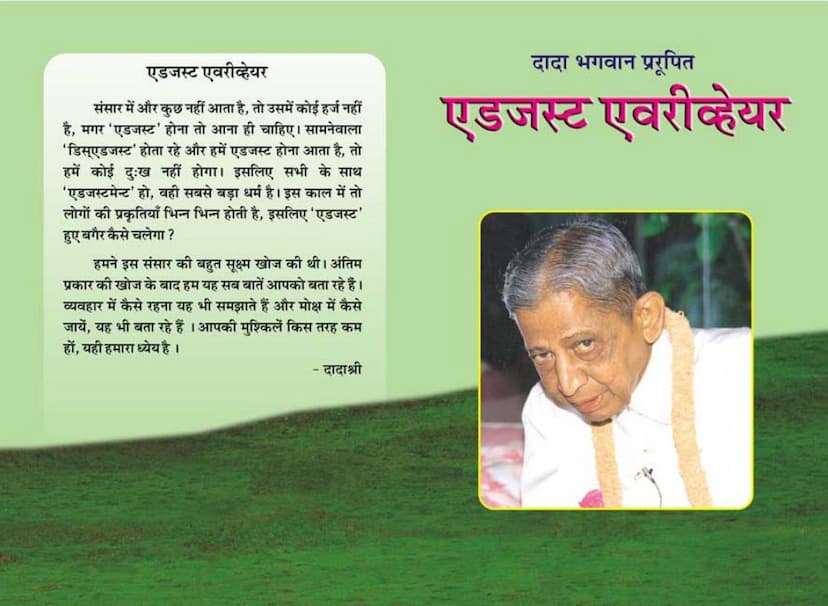Adjust Everywhere
Added to library: September 1, 2025

Summary
Here's a comprehensive summary of the Jain text "Adjust Everywhere" by Dada Bhagwan:
Core Message: The Paramount Importance of "Adjust Everywhere"
The central theme of "Adjust Everywhere" is that the ability to adapt and harmonize with all situations and people is the most crucial skill for navigating life and achieving peace. The book emphasizes that life itself is nothing but a series of adjustments, and failing to adapt leads to conflict, suffering, and a life filled with bitterness.
Key Concepts and Principles:
- "Adjust Everywhere" as the Ultimate Dharma: In this current era, with diverse human natures, adjusting to everyone is presented as the highest form of righteousness. Without adjustment, life will be filled with continuous conflict and unhappiness.
- Life is Adjustment: From birth to death, we are constantly required to make adjustments, whether we like it or not. This applies to education, marriage, family life, work, and all relationships.
- Benefits of Adjustment:
- Peace and Happiness: Understanding and adjusting to others leads to peace and contentment.
- Conflict Resolution: Adjusting avoids unnecessary confrontations and "terrible collisions."
- Spiritual Progress: Adjusting is a shortcut to spiritual liberation, acting like a lift to higher consciousness.
- Reduced Suffering: By adjusting, we prevent the binding of new karma and reduce the intensity of past karma.
- Dealing with "Disadjustment": The book advises that if the other person is "disadjusted" (uncooperative, difficult), and we can adjust, we will not suffer. Our ability to adjust will allow us to overcome the challenges of the world.
- Understanding Different Perspectives ("Vyu Point"): Every individual has their own viewpoint. Instead of judging or criticizing others, we should understand their perspective. Even those who are perceived as wrong or deceitful operate from their own truth. Instead of condemning them, we should aim to gently guide them towards the right path.
- The "Akram" Path (Non-Sequential Path): The book introduces the concept of the "Akram" path, a direct route to self-realization, as revealed by Dada Bhagwan. This path bypasses gradual step-by-step spiritual progress in favor of a more immediate spiritual breakthrough.
- The Nature of Dada Bhagwan: The text explains that "Dada Bhagwan" is the pure, realized Self residing within. The physical form of "A. M. Patel" was merely the medium through which Dada Bhagwan manifested and imparted this knowledge. Dada Bhagwan is not the individual body but the divine presence within all beings.
- Principles of Living: Dada Bhagwan lived by the principle, "There should be righteousness in business, not business in righteousness." He never accepted money from others and even used his excess earnings to help devotees on pilgrimages.
- The Role of the Wife (Counterpoise): The wife is described as a "counterpoise" to man, essential for balance. She is not meant to be changed but understood. Instead of trying to "fix" her, one should adjust. This understanding helps maintain harmony.
- The Science of Nature and "Counter Pulleys": The book delves into the "science of nature," comparing people to different flowers in a garden. Understanding the "revolutions" (thinking speed or pace) of others is crucial. When there's a mismatch in "revolutions," a "counter pulley" (adjustment) is needed to ensure smooth interaction and prevent conflict.
- The Root Cause of Suffering: The primary cause of suffering (klesh) is identified as ignorance, not differences in nature.
- Practical Examples and Anecdotes: The book uses numerous examples to illustrate the principle of adjustment:
- Adjusting to a messy bed, a disliked dish, or a wife's cooking.
- Responding to criticism with understanding rather than anger.
- Dealing with thieves or people with difficult temperaments.
- Handling situations where one's own preferences differ from others.
- The importance of not imposing one's opinion on others.
- The Power of "Yes" and "No": Saying "yes" to situations and people leads to peace, while saying "no" often creates conflict and complications.
- The Importance of Understanding and Acceptance: The book encourages recognizing that no one is inherently "bad." Differences are natural, and acceptance is key to harmonious living.
- The Goal of Self-Realization: While mastering worldly adjustments, the ultimate goal is to use this understanding to progress towards self-realization and liberation.
Key Takeaway:
The core message is simple yet profound: "Adjust Everywhere." By internalizing this principle, one can transform their life from a series of conflicts and suffering into a path of peace, harmony, and spiritual progress. The ability to adjust is presented not just as a social skill but as a vital spiritual tool for overcoming life's challenges and reaching the ultimate goal of liberation.